Written by Loh Yu Tong | Edited by Josh Lee Kok Thong
We’re all law and tech scholars now, says every law and tech sceptic. That is only half-right. Law and technology is about law, but it is also about technology. This is not obvious in many so-called law and technology pieces which tend to focus exclusively on the law. No doubt this draws on what Judge Easterbrook famously said about three decades ago, to paraphrase: “lawyers will never fully understand tech so we might as well not try”.
In open defiance of this narrative, LawTech.Asia is proud to announce a collaboration with the Singapore Management University Yong Pung How School of Law’s LAW4032 Law and Technology class. This collaborative special series is a collection featuring selected essays from students of the class. Ranging across a broad range of technology law and policy topics, the collaboration is aimed at encouraging law students to think about where the law is and what it should be vis-a-vis technology.
This piece, written by Loh Yu Tong, demonstrates how Singapore’s present criminal framework is ill-prepared to address offensive speech made by autonomous AI chatbots. The author examines the possible regulatory challenges that may arise, and identifies a negligence-based framework – under which a duty of care is imposed on developers, deployers and malicious third-party interferes – to be preferable over an intent-based one. Other viable solutions include employing regulatory and civil sanctions. While AI systems are likely to become more complex in the future, the author holds out hope that Singapore’s robust legal system can satisfactorily balance the deterrence of harm against the risk of stifling innovation.



